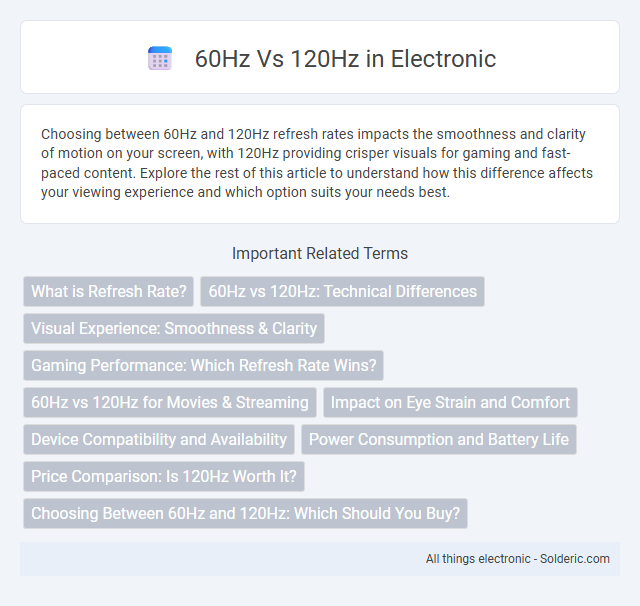Choosing between 60Hz and 120Hz refresh rates impacts the smoothness and clarity of motion on your screen, with 120Hz providing crisper visuals for gaming and fast-paced content. Explore the rest of this article to understand how this difference affects your viewing experience and which option suits your needs best.
Comparison Table
| Feature | 60Hz | 120Hz |
|---|---|---|
| Refresh Rate | 60 times per second | 120 times per second |
| Smoothness | Standard, less fluid motion | Extra smooth, fluid motion |
| Gaming Experience | Acceptable for casual gaming | Better for fast-paced and competitive gaming |
| Battery Usage (Mobile) | More energy efficient | Consumes more battery |
| Price | Generally lower cost | Higher cost due to advanced tech |
| Use Case | Everyday tasks, standard videos | Gaming, high frame rate videos, smooth scrolling |
What is Refresh Rate?
Refresh rate refers to the number of times per second a display updates its image, measured in Hertz (Hz). A 60Hz screen refreshes 60 times per second, while a 120Hz screen doubles that frequency, resulting in smoother motion and reduced motion blur. Choosing a higher refresh rate like 120Hz can enhance your viewing experience, especially in fast-paced gaming or video content.
60Hz vs 120Hz: Technical Differences
60Hz displays refresh the image 60 times per second, while 120Hz screens double that rate to 120 times per second, resulting in smoother motion and reduced blur. The higher refresh rate of 120Hz is particularly beneficial for fast-paced gaming and video playback, enhancing visual clarity and responsiveness. However, 120Hz panels may consume more power and require compatible hardware to fully utilize the increased refresh rate.
Visual Experience: Smoothness & Clarity
A 120Hz refresh rate delivers twice the frame updates per second compared to 60Hz, enhancing motion clarity and reducing blur for fast-moving images. This higher frequency results in smoother animations and transitions, creating a more immersive visual experience especially noticeable in gaming and video playback. Users benefit from reduced eye strain and improved responsiveness, making interactions feel more fluid and natural.
Gaming Performance: Which Refresh Rate Wins?
A 120Hz refresh rate significantly enhances gaming performance by delivering smoother motion and reduced input lag compared to 60Hz, resulting in a more responsive and immersive experience. Competitive gamers benefit from 120Hz monitors as they enable quicker reaction times and improved visual clarity during fast-paced gameplay. While 60Hz monitors are sufficient for casual gaming, 120Hz refresh rates provide a notable advantage in accuracy and fluidity for esports and high-frame-rate titles.
60Hz vs 120Hz for Movies & Streaming
A 120Hz refresh rate provides smoother motion and reduced blurring compared to 60Hz, enhancing your viewing experience for fast-moving scenes in movies and streaming content. Most films are shot at 24 frames per second, so 120Hz displays use frame interpolation techniques to deliver clearer images with less flicker. However, for standard streaming services, 60Hz is typically sufficient, but 120Hz is ideal for future-proofing and higher quality playback of sports or action-packed videos.
Impact on Eye Strain and Comfort
A 120Hz refresh rate significantly reduces eye strain compared to 60Hz by delivering smoother motion and minimizing flicker, which helps the eyes focus more comfortably during prolonged screen use. Higher refresh rates decrease motion blur and latency, making fast-moving visuals easier to process and reducing visual fatigue. Users sensitive to screen flicker often experience enhanced comfort with 120Hz displays, promoting longer, strain-free viewing sessions.
Device Compatibility and Availability
60Hz displays are universally compatible with most devices, including older smartphones, laptops, and budget monitors, ensuring widespread availability and affordability. 120Hz screens require compatible hardware and software support, often found in mid-range to high-end smartphones, gaming monitors, and TVs, limiting their availability to more recent or premium devices. Choosing between 60Hz and 120Hz depends on your device's specifications and whether you prioritize smoother motion or broader compatibility.
Power Consumption and Battery Life
Choosing between 60Hz and 120Hz refresh rates significantly impacts power consumption and battery life on devices like smartphones and laptops. A 120Hz display refreshes images twice as often as a 60Hz screen, leading to smoother visuals but approximately 20-30% higher battery drain during typical usage. Optimizing your settings to use 120Hz only when necessary can extend battery life without sacrificing performance during demanding tasks.
Price Comparison: Is 120Hz Worth It?
120Hz displays typically cost 20-50% more than 60Hz panels, with prices varying depending on screen size and technology. The smoother motion and reduced motion blur on 120Hz panels benefit gamers and content creators, but casual users may not notice significant improvement. Considering the price premium, 120Hz is worth the investment primarily for those seeking enhanced performance and visual fluidity.
Choosing Between 60Hz and 120Hz: Which Should You Buy?
Choosing between 60Hz and 120Hz depends on your usage and preferences: 120Hz offers smoother motion and better gaming experiences due to its higher refresh rate, reducing motion blur and screen tearing. A 60Hz display is typically sufficient for everyday tasks like browsing, streaming, and office work, providing good image quality at a lower cost and less power consumption. Your decision should weigh budget, device compatibility, and whether you prioritize fluid visuals for gaming or video playback.
60Hz vs 120Hz Infographic

 solderic.com
solderic.com